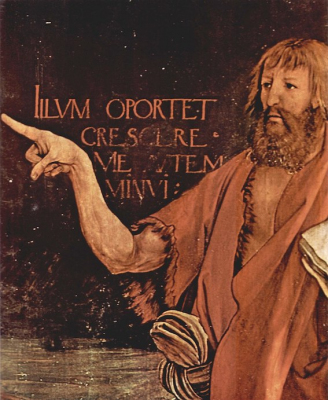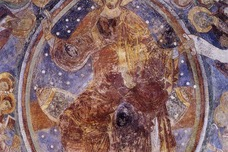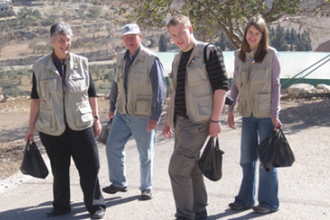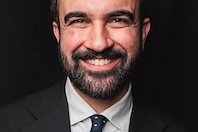Third Sunday in Advent Reflection with Canon Robin Gibbons

Mathis Gothart Grünewald
17 December 2023
Two figures dominate our scripture readings this Sunday, one very obvious because he is mentioned in the Gospel, John the Baptiser, cousin of Jesus. The other is present in her song which we use as the responsorial psalm, Mary the mother of Jesus and cousin of Elizabeth, mother of John. The first and second saints of our Christian tradition, Mary and John, true prophets by their words and lives of the great witness to the Divine Love given to us by Christ and enabled in us by the gift and anointing of the Holy Spirit. The prophet Isaiah clearly points this out to us at the beginning of our first reading; '
'The spirit of the Lord GOD is upon me,
because the LORD has anointed me'(Is 61:1)
What does this gift of the Spirit mean for us? Perhaps we assume that prophets either belong to a biblical past, or if they exist, arise to show us the future, warn us about the direction we take and the life we should live! Maybe! But that isn't really what the vocation of a prophet given us in the example of Mary and John suggests. For a start, no prophet can claim to be uttering their own truth, or declare that they are right and we are wrong - two basic facts many of those who claim to be modern religious prophets miss altogether! Secondly, as Paul reminds us in the second reading, if unceasing prayer is somehow at the heart of our calling, then the consequences of being a praying person will matter for the vocation of a prophet. I'd like to help any of you who puzzle about that phrase 'unceasing prayer', by suggesting as so many of our holy men and women do, that prayer is not just about words recited, sung, spoken aloud or in our hearts. Prayer is perhaps the summation of those three eternal gifts of the Spirit in our lives: Faith, Hope and Love! By this I mean that prayer is about living a life rooted consciously and unconsciously in Christ, in God, in the generosity of Love humans are called to share with each other, travelling each day by faith-not absolute certainty, by hope which brings joy and sees a greater destiny.
In the first letter to the Thessalonians Paul tells us what prayer means to him, three distinct things : 'Rejoice always. Pray without ceasing. In all circumstances give thanks, for this is the will of God for you in Christ Jesus. (I Thess 5:16-18)
This gives us a new idea about prayer, it is the command to 'love God and our neighbour as ourselves' by a total commitment to Christ; never slavish-but done out of our free choice and will; not sentimentally pious, but a real attempt to be the best we can be, just as we are! It is about 'being 'as well as 'doing', and it is of course about a relationship of love with the Holy One, fed by our own spiritual journey, which can never ever be divorced from real life. To rejoice is Pauls first indicative sign of a person who prays unceasingly, we get that in Mary's Magnificat, 'my soul rejoices', we detect it in the opening words about the Baptist in John's Gospel, for light brings joy : 'A man named John was sent from God. He came for testimony,* to testify to the light, so that all might believe through him. He was not the light, but came to testify to the light. The true light, which enlightens everyone, was coming into the world'.(Jn 1: 6-9)
The second element ' pray' is not concerned with words of observance, but as St Benedict terms his monks common prayer together, the 'Opus Dei', our own 'work of God'. Maybe we can think of prayer as our life's work, the prophets task, bound up in everything and anything that can link us and others to the real presence of the Most High in the here and now, the joys and sorrows, ever present, ever faithful with us, even if we are not with God. Prayer is a direction we take, but ever a reminder that God holds us even when we, like children, just forget. It is in this very direct prayer of the royalist general Sir Jacob Astley before the battle of EdgeHill in 1642 : '"Lorde, Thou knowest that I must be very busie this day. If I forget Thee, do not Thou forget me." That is directional prayer!
Then as if to pull us closer to the Great Thanksgiving of the Eucharist and those many moments of gratitude we find in the Liturgy, Sacraments, spiritual traditions and domestic practices of our faith, Paul tells us to 'give thanks always' but to have hope, for forgetfulness is allowable and excusable at times-because of this tendency we have a safeguard; as part of the family of God, that Body of Christ, we belong to one another, so when somebody or some community remembers us all at each moment of the day or night, their remembrance brings us closer into the circle of God, just as ours for one another does.
So, this Sunday is both a call to reassess our common Christian vocation, no matter who we are, and be a new prophet as Mary and John, to let the Spirit work mightily in us so that the fruits listed by Isaiah may be our gift, and identify us as true prophets, not the false ones that claim too loudly their self-importance:
'He has sent me to bring good news to the afflicted,
to bind up the broken-hearted,
To proclaim liberty to the captives,
release to the prisoners,
To announce a year of favour from the LORD
and a day of vindication by our God;
To comfort all who mourn.'(Is 61: 1-2a)
It is also a call to be true disciples of the unceasing prayer that is the daily sacrifice of our whole life, our love, our work, our care, and our concerns.
I just wanted to end with a quote of one of my constant themes, that image of Christ St Bede gives us, he who must become for us life's guide, our beginning and our ending, the star by which we navigate our lives :
'Christ is the Morning Star,
who, when the night of this world is past,
gives to his saints the promise of the light of life,
and opens everlasting day'.
Amen, Come Lord Jesus, come!
Lectio divina
Advent Hymns
1. Roman Vespers
Conditor Alme Siderum
Creator of the stars of night,
your people's everlasting light,
O Christ, Redeemer of us all,
we pray you hear us when we call.
In sorrow that the ancient curse
should doom to death a universe,
you came, O Saviour, to set free
your own in glorious liberty.
At your great Name, O Jesus, now
all knees must bend, all hearts must bow;
all things on earth with one accord,
like those in heaven, know you are Word.
To God the Father, God the Son,
and God the Spirit, Three in one,
praise, honor, might, and glory be
from age to age eternally.
Melody: Conditor Alme Siderum 7.7.7.7; Text: Anonymous, 7th Century
2. Genevan Psalter 16th c
A paraphrase of Isaiah 40:1-5
Text Johannes Olearius
Music Louis Bourgeois (1510-1561)
"Comfort, comfort now my people;
tell of peace!" So says our God.
"Comfort those who sit in darkness
mourning under sorrow's load.
To my people now proclaim
that my pardon waits for them!
Tell them that their sins I cover,
and their warfare now is over."
For the herald's voice is crying
in the desert far and near,
calling us to true repentance,
since the reign of God is here.
O, that warning cry obey!
Now prepare for God a way.
Let the valleys rise in meeting
and the hills bow down in greeting.
Straight shall be what long was crooked,
and the rougher places plain.
Let your hearts be true and humble,
as befits God's holy reign.
For the glory of the Lord
now on earth is shed abroad,
and all flesh shall see the token
that God's word is never broken


















